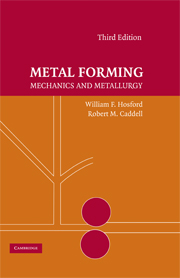Book contents
- Frontmatter
- Contents
- Preface to Third Edition
- 1 Stress and Strain
- 2 Plasticity
- 3 Strain Hardening
- 4 Instability
- 5 Temperature and Strain-Rate Dependence
- 6 Work Balance
- 7 Slab Analysis and Friction
- 8 Upper-Bound Analysis
- 9 Slip-Line Field Analysis
- 10 Deformation-Zone Geometry
- 11 Formability
- 12 Bending
- 13 Plastic Anisotropy
- 14 Cupping, Redrawing, and Ironing
- 15 Forming Limit Diagrams
- 16 Stamping
- 17 Other Sheet-Forming Operations
- 18 Formability Tests
- 19 Sheet Metal Properties
- Index
- References
16 - Stamping
Published online by Cambridge University Press: 05 June 2012
- Frontmatter
- Contents
- Preface to Third Edition
- 1 Stress and Strain
- 2 Plasticity
- 3 Strain Hardening
- 4 Instability
- 5 Temperature and Strain-Rate Dependence
- 6 Work Balance
- 7 Slab Analysis and Friction
- 8 Upper-Bound Analysis
- 9 Slip-Line Field Analysis
- 10 Deformation-Zone Geometry
- 11 Formability
- 12 Bending
- 13 Plastic Anisotropy
- 14 Cupping, Redrawing, and Ironing
- 15 Forming Limit Diagrams
- 16 Stamping
- 17 Other Sheet-Forming Operations
- 18 Formability Tests
- 19 Sheet Metal Properties
- Index
- References
Summary
STAMPING
Operations called stamping, pressing, and sometimes drawing involve clamping a sheet at its edges and forcing it into a die cavity with a punch, as shown in Figure 16.1. The sheet is stretched rather than squeezed between the tools. Pressure on the draw beads controls how much additional material is drawn into the die cavity. In some cases there is a die, which reverses the movement of material after it is stretched over the punch.
DRAW BEADS
Draw beads (Figure 16.2) are used to create tension in the sheet being formed by preventing excessive drawing. As a sheet moves through a draw bead, it is bent three times and unbent three times. Each bend and each unbend there requires plastic work. Over each radius there is friction. This create resistance to movement of the sheet. If the resistance is sufficiently high, the sheet will be locked by the draw bead. The restraining force of the draw bead can be controlled by the height of the insert.
The restraining force has two components. One is caused by the work necessary to bend and unbend the sheet as it flows over the draw bead and the other is the work to overcome friction. The restraining force F per length resulting from the bending and unbending can be crudely estimated with the following simplifying assumptions: Work hardening, elastic core, movement of the neutral plane, and the difference between engineering strain and true strain are neglected (ε = e).
- Type
- Chapter
- Information
- Metal FormingMechanics and Metallurgy, pp. 255 - 269Publisher: Cambridge University PressPrint publication year: 2007



